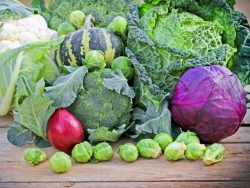
Cruciferous Vegetables, from the Academy of Nutrition and Dietetics
Specialists assisting early-childhood and school-aged children, as well as service and support administrators may appreciate the latest research-based findings regarding any beneficial dietary interventions for autism. Alternative health practitioners and advocacy groups promote special diets such as the gluten-free/casein-free diet. What does the research say about diet and autism? What can a public servant responsibly recommend?
Eagle Consulting encourages practitioners to review the series published on NutritionFacts.org on Autism. NutritionFacts.org, led by Dr. Michael Gregor, systematically reviews the approximately 10,000 research papers published each year on diet and nutrition. This series on Autism, published in late 2017, includes 14 videos, each about 5 minutes in length.
On the subject of the gluten-free/casein-free diet, Dr. Gregor’s assessment is that the strength of evidence is insufficient to recommend this intervention. While there are some research studies that show benefits, a meta-analysis which reviews the entire body of research on this particular intervention shows no effect.
On the other hand, check out the video Best Foods for Autism. This video presents research which shows that foods containing the substance sulforaphane, including broccoli, cabbage, brussel sprouts, kale and collard greens are beneficial for autism. These studies show “substantial improvements of individual ASD [Autism spectrum disorder] patients’ trajectories [which] were conspicuous.” The benefits are higher than those shown by any drug developed or tried for treating autism.
Other findings supported with strong strength of evidence are the correlations between the incidence of autism and the presence of air pollution and pesticide exposure. These findings are beneficial primarily from a public health perspective.
NutritionFacts.org is a strictly non-commercial, science-based public service led by Dr. Michael Greger and supported by the Jesse & Julie Rasch Foundation, as well as support from individual donors.

